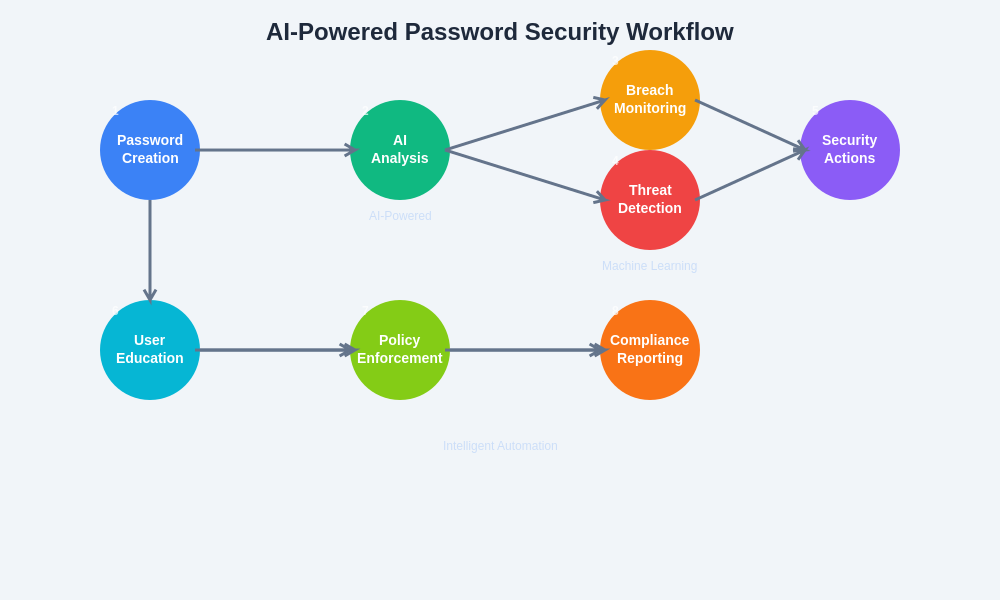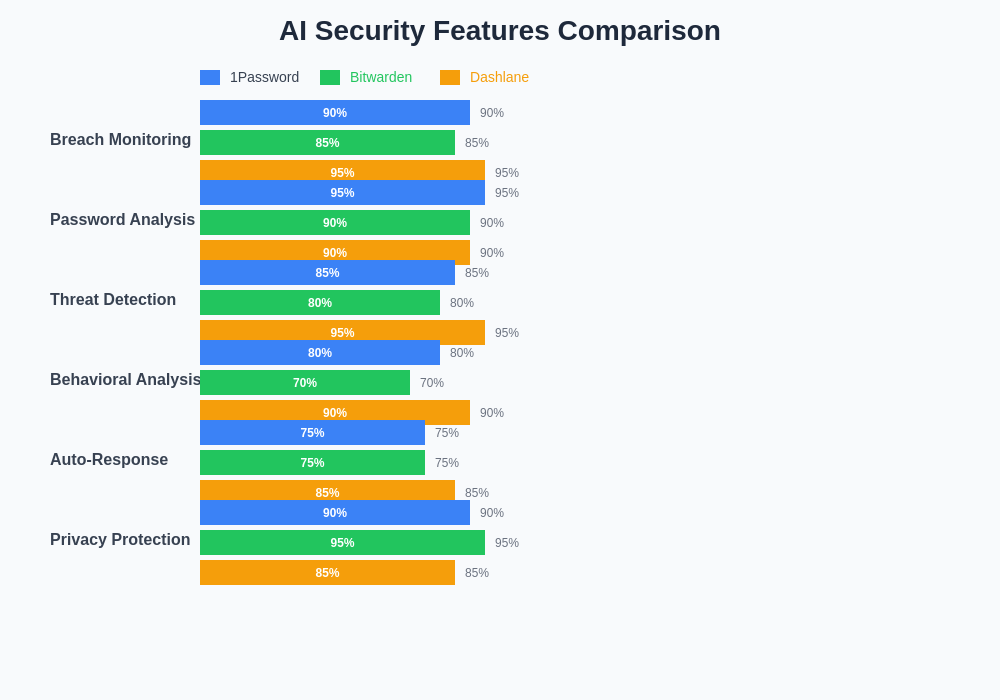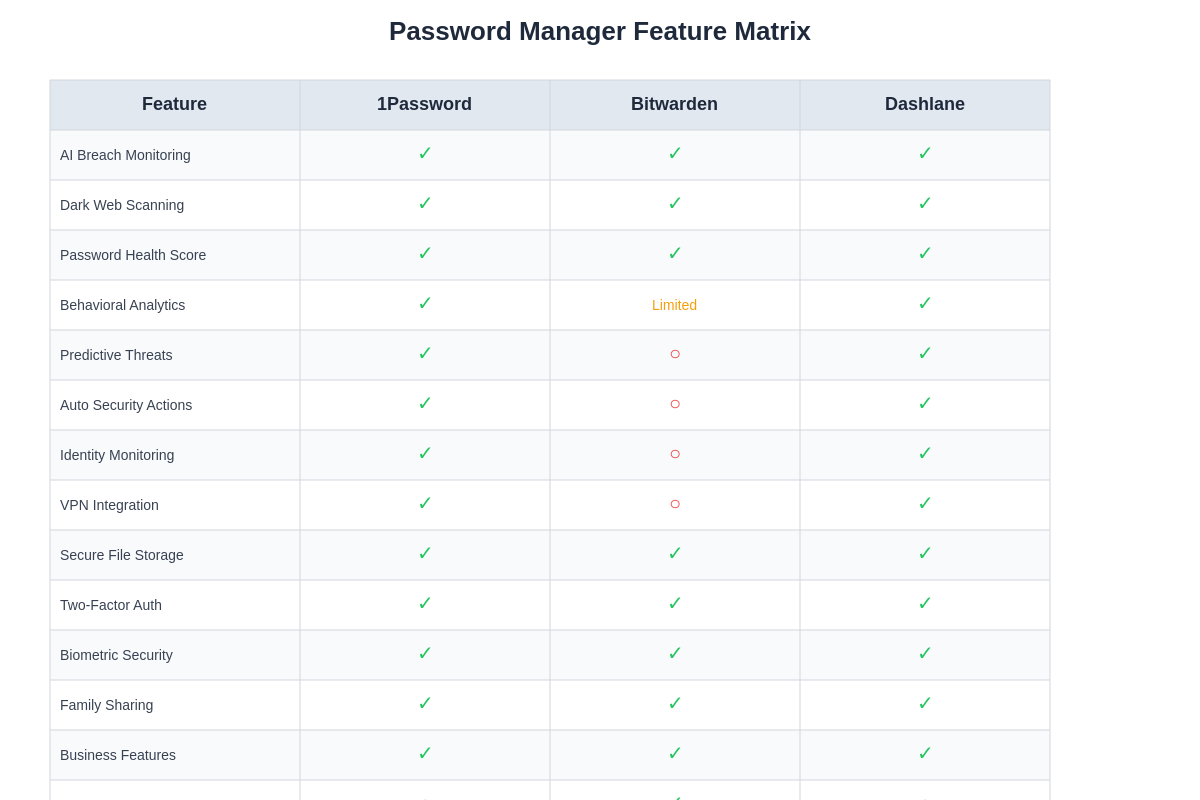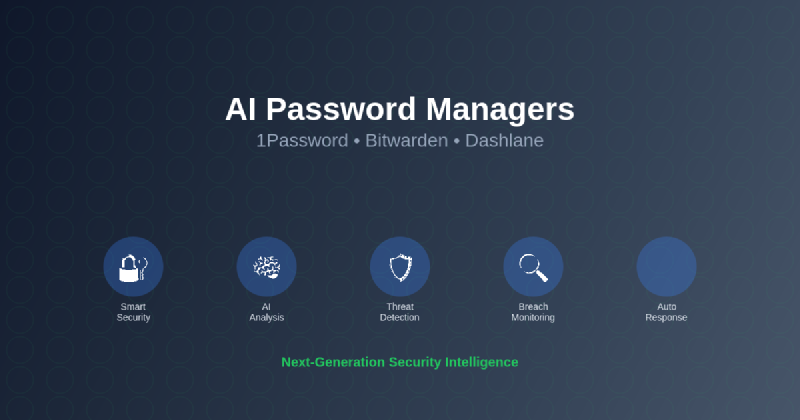The evolution of password management has reached a pivotal moment where artificial intelligence transforms how we secure our digital identities. Leading password managers like 1Password, Bitwarden, and Dashlane have integrated sophisticated AI technologies that go beyond simple password storage to provide intelligent threat detection, automated security assessments, and proactive protection against emerging cyber threats. This technological advancement represents a fundamental shift in cybersecurity strategy, where machine learning algorithms work continuously to safeguard user credentials while adapting to an ever-changing threat landscape.
Explore the latest AI security trends to understand how artificial intelligence is revolutionizing cybersecurity practices across industries. The integration of AI into password management systems demonstrates how intelligent automation can enhance security without compromising user experience, creating a new paradigm for digital privacy protection that combines convenience with enterprise-grade security measures.
The AI Revolution in Password Security
Traditional password managers have long provided essential security services through encrypted storage and password generation capabilities, but the introduction of artificial intelligence has elevated these tools to unprecedented levels of sophistication and effectiveness. Modern AI-powered password managers utilize machine learning algorithms to analyze user behavior patterns, detect anomalous activities, and provide real-time security recommendations that adapt to individual usage patterns and emerging threats.
The implementation of AI in password management extends far beyond automated password generation, encompassing intelligent breach monitoring, predictive threat analysis, and contextual security recommendations that help users maintain optimal security posture across all their digital accounts. These advanced systems continuously learn from global threat intelligence, user interactions, and security best practices to provide personalized protection that evolves with both individual needs and the broader cybersecurity landscape.

The sophisticated AI-powered security workflow demonstrates how modern password managers integrate multiple intelligence sources and automated processes to create comprehensive protection systems that operate continuously in the background while maintaining user privacy and control over sensitive credential data.
1Password: Pioneering AI-Enhanced Security Intelligence
1Password has established itself as a leader in AI-integrated password management through its comprehensive approach to intelligent security monitoring and user experience optimization. The platform’s AI capabilities include advanced breach detection systems that monitor the dark web and security databases for compromised credentials, providing immediate alerts when user passwords appear in data breaches or credential dumps.
The company’s Watchtower feature leverages artificial intelligence to continuously assess password strength, identify reused credentials, and flag potentially vulnerable accounts across a user’s digital ecosystem. This proactive approach to security management enables users to address vulnerabilities before they can be exploited by malicious actors, while the AI system learns from user preferences and security practices to provide increasingly personalized recommendations.
1Password’s AI integration extends to its password generation algorithms, which utilize machine learning to create passwords that balance security requirements with usability considerations for specific websites and applications. The system analyzes site-specific password requirements, user preferences, and security best practices to generate credentials that meet complex security standards while remaining manageable within the user’s workflow.
Experience advanced AI capabilities with Claude for comprehensive security analysis and intelligent decision-making support across various digital security challenges. The synergy between human security awareness and AI-powered monitoring creates a robust defense system that adapts to evolving threats while maintaining user accessibility and convenience.
Bitwarden: Open-Source AI Innovation
Bitwarden has distinguished itself in the password management landscape through its commitment to open-source development while incorporating cutting-edge artificial intelligence features that enhance security without compromising transparency. The platform’s AI-powered security audit capabilities provide comprehensive analysis of user password hygiene, identifying weak credentials, detecting password reuse patterns, and suggesting specific improvements to enhance overall security posture.
The organization’s approach to AI integration emphasizes privacy preservation and user control, ensuring that machine learning algorithms operate on encrypted data without exposing sensitive information to external analysis systems. This privacy-first approach to AI implementation demonstrates how advanced security features can be delivered while maintaining the transparency and user trust that define the open-source security community.
Bitwarden’s AI features include intelligent breach monitoring systems that scan multiple threat intelligence sources to identify compromised credentials, automated security scoring that evaluates overall account security health, and predictive analysis that helps users anticipate and prevent potential security incidents. The platform’s machine learning capabilities continuously improve through community feedback and global threat intelligence, creating a collaborative security ecosystem that benefits from collective intelligence while respecting individual privacy.
Dashlane: Advanced AI-Powered Security Ecosystem
Dashlane has pioneered the integration of comprehensive artificial intelligence throughout its password management platform, creating an intelligent security ecosystem that provides proactive protection, automated threat response, and personalized security guidance. The platform’s AI capabilities encompass advanced identity monitoring, predictive threat analysis, and intelligent security recommendations that adapt to individual user behaviors and risk profiles.
The company’s Dark Web Monitoring feature utilizes sophisticated machine learning algorithms to scan illicit marketplaces, hacker forums, and credential databases for compromised user information, providing immediate notifications when personal data appears in unauthorized contexts. This proactive monitoring approach enables users to respond quickly to potential security breaches before their accounts can be compromised by malicious actors.
Dashlane’s AI-powered Security Dashboard provides comprehensive visibility into user security posture through intelligent analysis of password strength, account vulnerabilities, and potential risk factors. The system’s machine learning capabilities continuously assess user behavior patterns to provide personalized security recommendations, identify unusual activities that may indicate account compromise, and suggest specific actions to improve overall digital security hygiene.
Comparative Analysis of AI Features
The artificial intelligence capabilities implemented across 1Password, Bitwarden, and Dashlane demonstrate different approaches to integrating machine learning into password management systems, each offering unique advantages and specialized features that cater to different user needs and security requirements. Understanding these distinctions enables users to select the platform that best aligns with their specific security priorities and usage patterns.
1Password’s AI implementation focuses primarily on proactive threat intelligence and user experience optimization, leveraging machine learning to provide seamless security recommendations that integrate naturally into existing workflows. The platform’s emphasis on enterprise-grade security features makes it particularly suitable for business environments where comprehensive security monitoring and centralized management capabilities are essential.
Bitwarden’s approach to AI integration prioritizes transparency and community-driven innovation, ensuring that advanced security features remain accessible to users who require open-source solutions without compromising on intelligent security capabilities. The platform’s commitment to privacy-preserving AI demonstrates how machine learning can enhance security while maintaining user trust and data sovereignty.
Dashlane’s comprehensive AI ecosystem provides the most extensive range of intelligent security features, including advanced identity monitoring, predictive threat analysis, and personalized security guidance that adapts to individual user behaviors. The platform’s focus on consumer-friendly AI implementation makes advanced security features accessible to users regardless of their technical expertise or security knowledge.

The evolution of AI-powered security features across leading password managers demonstrates how machine learning technologies can enhance traditional security measures while providing new capabilities that were previously unavailable through conventional approaches. These intelligent systems create layered security architectures that combine automated threat detection with human decision-making to provide comprehensive protection against evolving cyber threats.
Discover comprehensive AI research capabilities with Perplexity for in-depth analysis of emerging security technologies and threat intelligence that informs password management strategies. The integration of multiple AI-powered security tools creates a robust defense ecosystem that adapts to changing threat landscapes while maintaining user privacy and accessibility.
Machine Learning in Threat Detection
The implementation of machine learning algorithms in modern password managers has revolutionized threat detection capabilities by enabling real-time analysis of user behavior patterns, credential usage trends, and potential security anomalies that might indicate account compromise or malicious activity. These intelligent systems continuously learn from global threat intelligence, user interactions, and security incidents to improve their detection accuracy and reduce false positive alerts.
Advanced machine learning models analyze vast datasets of compromised credentials, attack patterns, and security incidents to identify emerging threats before they can impact individual users. This predictive approach to security enables password managers to provide proactive protection that anticipates potential vulnerabilities and suggests preventive measures before security incidents occur.
The sophistication of modern AI threat detection systems extends to behavioral analysis that can identify subtle changes in user access patterns, login locations, and credential usage that may indicate unauthorized account access. These systems establish baseline behavioral profiles for individual users and continuously monitor for deviations that might suggest account compromise, providing immediate alerts and suggested response actions when suspicious activities are detected.
Automated Security Assessments and Recommendations
Artificial intelligence has transformed security assessment processes by enabling automated analysis of password strength, account vulnerabilities, and overall security posture across entire digital ecosystems. Modern AI-powered password managers can evaluate hundreds of user accounts simultaneously, identifying weak credentials, detecting password reuse patterns, and prioritizing security improvements based on risk assessment algorithms.
The intelligence embedded in these assessment systems goes beyond simple password strength analysis to include contextual evaluation of account importance, potential impact of compromise, and user-specific risk factors that influence security recommendations. This comprehensive approach enables password managers to provide personalized security guidance that addresses individual vulnerabilities while considering practical usage requirements and user preferences.
Machine learning algorithms continuously refine their assessment criteria based on emerging threats, security research findings, and real-world attack patterns, ensuring that security recommendations remain current and effective against evolving cyber threats. This adaptive approach to security assessment provides users with guidance that reflects the latest understanding of cybersecurity best practices and threat mitigation strategies.
Privacy Considerations in AI-Powered Security
The integration of artificial intelligence into password management systems raises important questions about data privacy, user consent, and the balance between security enhancement and personal information protection. Leading password managers have implemented sophisticated privacy-preserving AI architectures that enable advanced security features while maintaining strict data protection standards and user privacy rights.
Modern AI-powered password managers utilize techniques such as differential privacy, federated learning, and encrypted computation to analyze user data without exposing sensitive information to external systems or unauthorized access. These privacy-preserving approaches enable the benefits of machine learning analysis while ensuring that personal information remains protected throughout the security enhancement process.
The implementation of privacy-first AI architectures demonstrates how advanced security technologies can be developed and deployed in ways that respect user privacy expectations while providing meaningful security improvements. This approach to AI development establishes important precedents for how machine learning can be responsibly integrated into security-critical applications without compromising user trust or data sovereignty.
Integration with Enterprise Security Ecosystems
The enterprise adoption of AI-powered password managers has been driven by their ability to integrate seamlessly with existing security infrastructure while providing enhanced visibility and control over organizational credential management. These systems provide centralized administration capabilities, comprehensive audit trails, and intelligent policy enforcement that align with corporate security requirements and compliance standards.
Enterprise-focused AI features include advanced user behavior analytics that can identify potential insider threats, automated compliance reporting that demonstrates adherence to security policies, and intelligent access management that adapts to organizational workflows while maintaining security controls. These capabilities enable organizations to implement comprehensive password security programs that scale across large user populations while maintaining operational efficiency.
The integration of AI-powered password managers with existing enterprise security tools creates comprehensive security ecosystems that leverage multiple intelligence sources to provide enhanced threat detection, automated incident response, and coordinated security management across diverse technology environments. This integrated approach to security management demonstrates how AI can enhance existing security investments while providing new capabilities that address emerging threats.

The comprehensive feature comparison across leading AI-powered password managers reveals the diverse approaches to integrating machine learning capabilities while addressing different user needs and security requirements. Understanding these feature distinctions enables informed decision-making about which platform best aligns with specific security objectives and operational requirements.
Future Developments in AI Password Security
The continued evolution of artificial intelligence in password management systems promises even more sophisticated security capabilities that will further enhance protection against emerging cyber threats while improving user experience and accessibility. Anticipated developments include advanced behavioral biometrics, contextual authentication systems, and predictive security models that can anticipate and prevent security incidents before they occur.
Emerging AI technologies such as natural language processing and computer vision are expected to enable new forms of security interaction that make advanced security features more accessible to users regardless of their technical expertise. These developments will likely include voice-activated security commands, intelligent security education systems, and automated security configuration that adapts to individual user needs and preferences.
The integration of quantum-resistant cryptographic algorithms with AI-powered security systems represents another frontier in password management evolution, ensuring that current investments in intelligent security infrastructure remain effective against future technological developments. This forward-looking approach to security architecture demonstrates how AI can provide not only current protection but also adaptability to future security challenges.
Implementation Best Practices and User Guidelines
The successful deployment of AI-powered password managers requires understanding of best practices that maximize security benefits while ensuring optimal user experience and system performance. These guidelines encompass account configuration, security policy implementation, and ongoing management practices that enable users to fully leverage advanced AI capabilities.
Effective implementation begins with comprehensive security assessment that identifies existing vulnerabilities, establishes baseline security measurements, and defines improvement objectives that guide the deployment process. This systematic approach ensures that AI-powered features are configured to address specific security needs while providing measurable improvements in overall security posture.
Ongoing management of AI-powered password systems requires regular review of security recommendations, prompt response to threat alerts, and continuous education about emerging security best practices. This proactive approach to password security management ensures that users can adapt to evolving threats while maintaining the benefits of intelligent security automation.
Cost-Benefit Analysis and Selection Criteria
The evaluation of AI-powered password managers requires comprehensive analysis of features, pricing, and long-term value propositions that align with specific security requirements and budget constraints. This assessment process should consider not only immediate security improvements but also the potential for future feature development and integration with evolving security ecosystems.
Cost considerations extend beyond subscription pricing to include implementation time, training requirements, and ongoing management overhead that influence the total cost of ownership for advanced password management solutions. Understanding these comprehensive cost factors enables informed decision-making about which platform provides the best value proposition for specific use cases and organizational requirements.
The selection process should prioritize security capabilities that address identified vulnerabilities while considering user experience factors that influence adoption rates and long-term success. This balanced approach to platform selection ensures that chosen solutions provide both immediate security improvements and sustainable long-term benefits that justify the investment in advanced password management technology.
Conclusion: The Future of Intelligent Password Security
The integration of artificial intelligence into password management represents a fundamental advancement in cybersecurity technology that provides unprecedented levels of protection while enhancing user experience and accessibility. The leading platforms in this space demonstrate how machine learning can be responsibly implemented to create security solutions that adapt to evolving threats while respecting user privacy and maintaining transparency.
The continued development of AI-powered password security systems promises even greater capabilities that will further strengthen digital identity protection while making advanced security features accessible to users across all technical skill levels. This democratization of sophisticated security technology represents a significant step forward in creating a more secure digital ecosystem that protects individual privacy while enabling the benefits of connected digital services.
The future of password management lies in the intelligent integration of human security awareness with AI-powered automation, creating security ecosystems that provide both proactive protection and responsive adaptation to emerging threats. This collaborative approach to cybersecurity demonstrates how technology can enhance human capabilities while maintaining the personal agency and control that define effective security practices.
Disclaimer
This article is for informational purposes only and does not constitute professional cybersecurity advice. The views expressed are based on current understanding of AI technologies and their applications in password management systems. Readers should conduct their own security assessments and consider their specific requirements when selecting password management solutions. The effectiveness of AI-powered security features may vary depending on individual use cases, threat environments, and implementation practices. Users should regularly review and update their security practices based on evolving threats and best practices recommendations.
